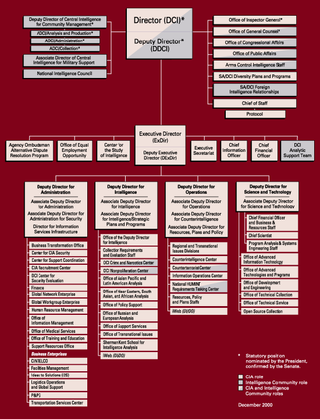
The Defense Intelligence Agency (DIA) is an intelligence agency and combat support agency of the United States Department of Defense, specializing in defense and military intelligence.

Human intelligence is intelligence gathered by means of interpersonal contact, as opposed to the more technical intelligence gathering disciplines such as signals intelligence (SIGINT), imagery intelligence (IMINT) and measurement and signature intelligence (MASINT).

Counterintelligence (counter-intelligence) or counterespionage (counter-espionage) is any activity aimed at protecting an agency's intelligence program from an opposition's intelligence service. It includes gathering information and conducting activities to prevent espionage, sabotage, assassinations or other intelligence activities conducted by, for, or on behalf of foreign powers, organizations or persons.
James L. Pavitt was Deputy Director for Operations (DDO) for the CIA from 23 June 1999 until July 12, 2004, when he resigned a day after George Tenet. The CIA said the resignations was for personal reasons.

James Arthur Williams was a United States Army lieutenant general. Williams served as Director of the Defense Intelligence Agency in the 1980s. He was a 1987 inductee of the Military Intelligence Hall of Fame and was the chairman of the board of directors for the National Military Intelligence Association.

Lieutenant General Samuel Vaughan Wilson, aka "General Sam", completed his active military career in the fall of 1977, having divided his service almost equally between special operations and intelligence assignments.

The Directorate of Operations (DO), less formally called the Clandestine Service, is a component of the US Central Intelligence Agency. It was known as the Directorate of Plans from 1951 to 1973; as the Directorate of Operations from 1973 to 2005; and as the National Clandestine Service (NCS) from 2005 to 2015.

The under secretary of defense for intelligence and security or USD(I&S) is a high-ranking civilian position in the Office of the Secretary of Defense (OSD) within the U.S. Department of Defense (DoD) that acts as the principal civilian advisor and deputy to the secretary of defense (SecDef) and deputy secretary of defense (DepSecDef) on matters relating to military intelligence and security. The under secretary is appointed as a civilian by the president and confirmed by the Senate to serve at the pleasure of the president.

Scott F. Large is an American intelligence officer who served as the sixteenth Director of the National Reconnaissance Office from 2007 to 2009. He previously served as the Principal Deputy Director of the National Reconnaissance Office from April to October 2007, and as the Central Intelligence Agency's Associate Deputy Director for Science and Technology.
The Clandestine HUMINT page adheres to the functions within the discipline, including espionage and active counterintelligence.
National governments deal in both intelligence and military special operations functions that either should be completely secret, or simply cannot be linked to the sponsor. It is a continuing and unsolved question for governments whether clandestine intelligence collection and covert action should be under the same agency. The arguments for doing so include having centralized functions for monitoring covert action and clandestine HUMINT and making sure they do not conflict, as well as avoiding duplication in common services such as cover identity support, counterespionage, and secret communications. The arguments against doing so suggest that the management of the two activities takes a quite different mindset and skills, in part because clandestine collection almost always is on a slower timeline than covert action.
Clandestine HUMINT asset recruiting refers to the recruitment of human agents, commonly known as spies, who work for a foreign government, or within a host country's government or other target of intelligence interest for the gathering of human intelligence. The work of detecting and "doubling" spies who betray their oaths to work on behalf of a foreign intelligence agency is an important part of counterintelligence.
The Intelligence Medal of Merit is awarded by the Central Intelligence Agency for performance of especially meritorious service or for achievement conspicuously above normal duties.

The CIA publishes organizational charts of its agency. Here are a few examples.
Arturo G. Muñoz is a former Central Intelligence Agency (CIA) senior intelligence officer with three decades of analytical skills and operational experience, both in the Directorate of Intelligence (DI) and in the Directorate of Operations (DO). He managed highly classified covert-operations and HUMINT collections for the CIA National Clandestine Service in various high-ranking positions. Muñoz is highly regarded at the CIA as an intelligence officer and a psychological operations expert with countless successful programs; to include innovative covert action campaigns with verifiable impacts in Latin America, Southwest Asia, the Balkans, the Middle-East, and North-Africa. Muñoz is a well known pundit on national security, international affairs, espionage and U.S. foreign policy.

Michael E. Ennis is a former major general in the United States Marine Corps.

The Defense Clandestine Service (DCS) is an arm of the Defense Intelligence Agency (DIA), which conducts clandestine espionage, intelligence gathering activities and classified operations around the world to provide insights and answer national-level defense objectives for senior U.S. policymakers and American military leaders. Staffed by civilian and military personnel, DCS is part of DIA's Directorate of Operations and works in conjunction with the Central Intelligence Agency's Directorate of Operations and the U.S. military's Joint Special Operations Command. DCS consists of about 500 clandestine operatives, which is roughly how many case officers the CIA maintained in the early 2000s prior to its expansion.

Sean M. Joyce was the 14th Deputy Director of the Federal Bureau of Investigation.

Colonel Kurush Bharucha-Reid or "KB" gained prominence as an intelligence and special operations expert in the United States Army from 1973 to 2010 who garnered respect across the US Special Operations and United States Intelligence Community for his significant impacts on Defense HUMINT.
Mark E. Kelton is a former senior executive of the Central Intelligence Agency, concluding his career with the position of Deputy Director of the National Clandestine Service for Counterintelligence (DDNCS/CI). He is currently an adjunct assistant professor at Georgetown University, and Director of Threat Insider Solutions at Cipher Systems, LLC.












